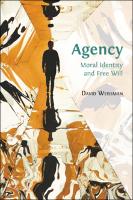Agency
Moral Identity and Free Will
Author(s)
Weissman, David
Collection
ScholarLedLanguage
EnglishAbstract
"There is agency in all we do: thinking, doing, or making. We invent a tune, play, or use it to celebrate an occasion. Or we make a conceptual leap and ask more abstract questions about the conditions for agency. They include autonomy and self-appraisal, each contested by arguments immersing us in circumstances we don’t control. But can it be true we that have no personal responsibility for all we think and do?
Agency: Moral Identity and Free Will proposes that deliberation, choice, and free will emerged within the evolutionary history of animals with a physical advantage: organisms having cell walls or exoskeletons had an internal space within which to protect themselves from external threats or encounters. This defense was both structural and active: such organisms could ignore intrusions or inhibit risky behavior. Their capacities evolved with time: inhibition became the power to deliberate and choose the manner of one’s responses. Hence the ability of humans and some other animals to determine their reactions to problematic situations or to information that alters values and choices. This is free will as a material power, not as the conclusion to a conceptual argument. Having it makes us morally responsible for much we do. It prefigures moral identity.
Closely argued but plainly written, Agency: Moral Identity and Free Will speaks for autonomy and responsibility when both are eclipsed by ideas that embed us in history or tradition. Our sense of moral choice and freedom is accurate. We are not altogether the creatures of our circumstances.
"
Keywords
agency; moral identity; free will; philosophy; moral philosophyDOI
10.11647/OBP.0197ISBN
9781783748754, 9781783748761, 9781783748785, 9781783748792, 9781783748808Publisher
Open Book PublishersPublisher website
https://www.openbookpublishers.com/Publication date and place
2020Classification
Philosophy
Ethics and moral philosophy
Social and political philosophy


 Download
Download Web Shop
Web Shop